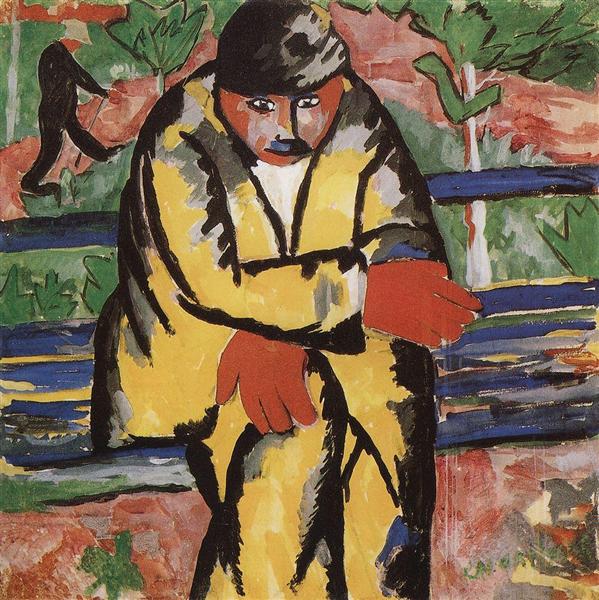Description
Kazimir Malevich, famous for his seminal contribution to suprematism, offers us in "on boulevard" (1911) a window towards its stylistic transition from neo -demitivism and futurism towards the radical geometric abstraction that would mark his career. This painting, which precedes his suprematist works, somehow encapsulates Malevich's evolution and aesthetic concerns.
The scene develops in an urban environment, which is suggested rather than defined, with forms that, although not completely lacking, already give clues of the road to total abstraction. Faithful to his moment of experimentation with Cubism and Futurism, in "On Boulevard", Malevich plays with fragmentation and multiplicity of perspectives. Human figures, outlined in vibrant and contrasting colors, seem to integrate and dissolve simultaneously in the environment.
The color is vibrant and bold, a testimony of the influence of Fauvism in its palette during this stage. Intense reds, bright yellow and deep blue are perceived that rival the viewer's attention, and that work not only as decorative elements but as expressive components that give the work a dynamic and vibrant sensation. Human figures are represented in an almost theatrical composition, with a sense of movement and energy that refers us to the bustling life of the city.
The pictorial texture is remarkably rich and varied. Malevich uses broad and visible brushstrokes, a technique that underlines the materiality of the painting and invites the viewer to be aware of the artistic process itself. This trait moves away from mimetic representation and suggests a more visceral and direct appreciation of the act of painting.
It is important to observe how Malevich, even at this early stage, begins to dissolve the forms in an effort to capture something more essential than the mere appearance of things. The figures, although recognizable as human, are divided into planes of color and form that almost anticipate the total dematerialization of their suprematist work. It is a composition that seems unstable, in constant fluctuation, which could be interpreted as a metaphor for changing times and accelerated modernity.
In terms of historical context, "on the boulevard" it also reflects the tensions and social transformations of prerrevolutionary Russia. Urbanization and life in cities offered both promises of progress and disorientation, issues that Malevich captures with a mixture of hope and confusion.
Although "on the boulevard" it is not as well known as its subsequent suprematist compositions as "black square" (1915), it provides a valuable look at the artist's experimental laboratory. Here, Malevich is still negotiating with the visible world, transforming it and decomposing it in search of a new visual language. The work is an amalgam of its early artistic search, which would culminate in visual radicalism that consecrated it as one of the pioneers of the avant -garde of the twentieth century.
Analyzing "on the boulevard" allows us not only to appreciate the talent of Malevich to capture the dynamism of the urban environment, but also to understand its deep and constant concern to transcend the perceptible reality in search of the sublime, an effort that would define its entire career and Legacy in modern art.
KUADROS ©, a famous paint on your wall.
Hand-made oil painting reproductions, with the quality of professional artists and the distinctive seal of KUADROS ©.
Art reproduction service with satisfaction guarantee. If you are not completely satisfied with the replica of your painting, we refund your money 100%.

